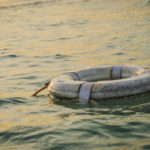As I write this, Hurricane Laura is likely to be a dangerous Category 4 hurricane. There will be extensive and terrible devastation to those living on the Gulf Coast in Texas and Louisiana.
One of the ways God shines his light through the darkness of natural disasters is through all of those who rush to help and provide aid. My community saw this after being ground zero for Hurricane Harvey three years ago. I could see the Lord in all the help my community received from people from every state and from around world.
Perhaps you and your church are considering providing help to those in the path of Hurricane Laura. I give thanks for you.
Here are some things to keep in mind after the storm has passed and the recovery phase has begun.
1. Pray
There is no way to describe all the emotions, challenges, frustrations, despair, hope and joy people experience in a natural disaster. Ask God to reveal himself, so people will be reminded constantly of his presence each day and receive strength.
2. Be patient.
After Hurricane Harvey hit our community, it took time for people to get their footing and know what was needed, where to store it, and how to distribute it.
I was contacted by people the day after the storm asking me what I needed or telling me what they were bringing. Having just experienced a traumatic event, I wasn’t prepared to manage a recovery effort. We eventually caught our breath and hit the ground running, but it took time.
3. Try not to create a second disaster through your donations.
We were blessed and overwhelmed by the material goods donated to our community. But not everything was helpful.
The idea is to donate items that will move quickly to those in need, and not sit in some storage space for months or years to come. Things like food or insect repellent went quickly. Huge boxes of underwear took longer to distribute and had to be stored.
Sign up for our weekly edition and get all our headlines in your inbox on Thursdays
Consider calling an organization, a church or government official in the community you want to help, and get current information about what they need. Sometimes they update websites and social media with this information.
It is not a good idea just to show up asking to unload your donated goods anywhere you can.
4. Financial gifts are especially helpful, but be clear about how you want your financial gift to be used.
Our church received financial donations after Harvey from donors around the world. These gifts allowed us to help hundreds of families in our community and in the surrounding area.
We found the need to ask donors to clarify for us how their donations were to be used. Some people want to help a specific church and will not designate their gift, allowing the church to use the funds for things such as meeting payroll, paying bills and so on. Others want to give the church the resources to help people in the community and will donate to that church’s designated benevolence fund.
It always is best to get as much information as possible to make sure the financial gift goes where it is most needed. Organizations such as Texas Baptist Men and Samaritan’s Purse have good track records in disaster recovery work and always are safe places to make donations.
5. Volunteer in the recovery effort if you can, when you can, and as often as you can.
Volunteers will be needed in the community for months and years to come.
Eventually, the Texas Emergency Management Team will work with local governments to set up a Volunteer Reception Center that coordinates the work of individuals and groups with area residents who have signed up for help. The Volunteer Reception Center will handle all the legal release forms for property owners and volunteers, as well as help the county government track volunteer hours.
FEMA covers much of the cost of disaster recovery, but not all the cost. Local governments must pay a portion of the bill, but this amount is discounted based on the number of volunteer hours invested in those communities.
It is also a good idea simply to volunteer with a relief organization such as Texas Baptist Men or Samaritan’s Purse. The work will include clearing and cleaning properties, moving debris to the road for pickup, demolition to properties and more.
I personally enjoyed those people who showed up with their grills and cooked hamburgers or hot dogs for people in the community. Keep in mind, however, it is unlikely you will find lodging anywhere near the disaster area; so, be sure to plan well.
I learned state and federal agencies will do much to help people in a natural disaster, but they cannot do everything. The private sector, relief organizations and churches also must rise to the occasion, so no one in need is left behind. I am thankful for those who helped me and my community in our time of need.
Scott Jones is the pastor of First Baptist Church in Rockport, Texas, which suffered extensive damage during Hurricane Harvey in 2017. The views expressed are those solely of the author.















We seek to connect God’s story and God’s people around the world. To learn more about God’s story, click here.
Send comments and feedback to Eric Black, our editor. For comments to be published, please specify “letter to the editor.” Maximum length for publication is 300 words.